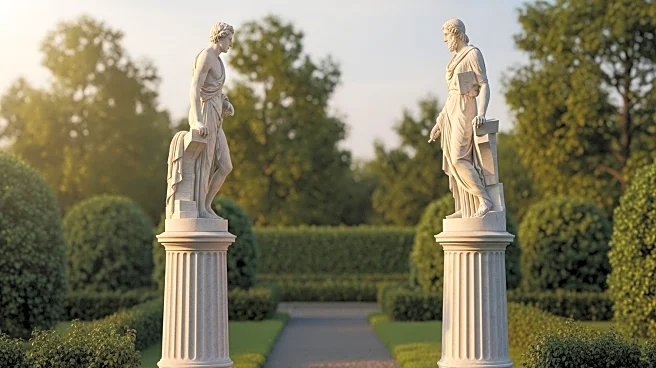What is the story about?
What's Happening?
Following the death of conservative activist Charlie Kirk, lawmakers have proposed erecting statues in his honor, particularly on public college campuses. This initiative has sparked controversy, as it is unusual for figures to be memorialized so quickly after their passing. Oklahoma lawmakers have introduced legislation requiring state universities to install Kirk statues, while Texas state Rep. Nate Schatzline has called for similar measures. New College of Florida announced plans to commission a Kirk statue, reflecting his influence among young conservatives. The proposals have revived debates on who should be commemorated, especially in light of recent removals of controversial monuments.
Why It's Important?
The push for Charlie Kirk statues highlights the ongoing cultural and political battles in the U.S. over public memorials. It underscores the polarization in American society, where figures like Kirk are seen as martyrs by some and divisive by others. The initiative reflects a broader conservative backlash against the removal of monuments deemed offensive by activists. This debate is significant as it touches on issues of historical memory, identity, and the role of public art in shaping societal values. The outcome could influence how future memorials are approached and the narratives they represent.
What's Next?
If the proposed legislation passes, it could set a precedent for rapid memorialization of political figures, potentially altering the landscape of public monuments in the U.S. The debate may lead to further discussions on the criteria for memorialization and the role of public opinion in these decisions. Stakeholders, including educational institutions and political leaders, will likely continue to engage in discussions about the appropriateness and implications of such memorials. The controversy may also prompt broader conversations about the representation of diverse perspectives in public spaces.
Beyond the Headlines
The proposal for Kirk statues raises questions about the intersection of politics and public art. It challenges traditional approaches to memorialization, which typically involve a period of reflection before permanent monuments are erected. This urgency to memorialize Kirk may reflect ideological motivations rather than communal consensus. The debate also touches on the ethical considerations of using public spaces for political expression and the potential for monuments to become sites of contention.















